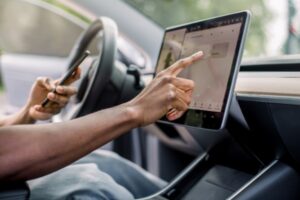
While they have benefits, the law has not quite caught up with the times, and one issue that has arisen is whether a person can be arrested for a DUI when they are in a self-driving car. After all, they are not actually driving the vehicle; a computer is. In a simple answer, yes, you could be arrested, but whether you could be convicted might be another story.
If you are facing DUI charges, don’t hesitate to contact New Mexico Criminal Law Offices today.
Self-Driving Cars Today Are Not 100% Self-Driving
While there are vehicles out there that self-drive, there is no vehicle that is completely autonomous. The closest yet is the Tesla model, but even that requires some driver interaction. These vehicles have highly intelligent driver-assist programs that maintain speeds, slow and stop when entering a collision, and avoid lane changes unnecessarily. However, no vehicle drives itself without the driver doing something.
Therefore, one could argue that the driver was, in fact, operating the vehicle under the influence – even if they were not physically driving it at the time.
That said, the circumstances surrounding the arrest and how much control the driver had over the vehicle’s operation do come into play.
Was the Driver in Physical Control of the Vehicle’s Operation?
The biggest question is whether the driver was in control of the vehicle at the time. To be charged with a DUI, a person must be operating a vehicle while under the influence. Therefore, the court would have to determine how much “operating” the driver was doing. The following circumstances make it easier for the prosecution to secure a conviction:
- The driver was in the driver’s seat of the vehicle.
- The keys were in the ignition and the self-driving car’s engine was running.
- The vehicle was parked on the side of the road, which means it had to be driven there and parked by someone.
Did Law Enforcement Have Probable Cause to Stop the Vehicle?
Here is where securing a conviction could be difficult. A driver may operate a vehicle, but if law enforcement did not have probable cause to stop that vehicle in the first place, then all evidence found afterward is no longer admissible in court.
Also, this is where the issue of self-driving technology can pit the law against law enforcement.
A self-driving vehicle does not speed, does not weave in and out of lanes, and drives (supposedly) safer than any human driver. Most drunk drivers are weaving in and out of lanes, unable to follow speed limits, and their actions on the roadway make them obvious to law enforcement, which gives law enforcement probable cause to pull them over and check to see if they are intoxicated.
With a self-driving car, how likely is it the officer would have probable cause? After all, there should be no legal reason for a traffic stop, because the car is staying in its lane, observing the speed limit, and not exhibiting any erratic behavior.
How Does the Law Define a DUI in Your State?
The other big question is the language of the law. If the law specifically states that a person cannot “operate” a vehicle while under the influence, then even riding in your self-driving car (in the driver’s seat) constitutes operating while under the influence. Most states, including New Mexico, say “operating,” which means you could be charged with a DUI and convicted if the state has enough evidence to support their case.
The Level of Self-Driving Features in the Vehicle
As stated before, there is not a 100 percent self-driving car on the roads today. While there are some that come incredibly close, there is some sort of human operation required. For example, Tesla’s Autopilot feature can respond to road conditions, park itself, and even automatically drive you home if you do not tell it a destination. So, are you really in “physical control” of the vehicle if you are using the autopilot features?
Some would argue yes, you were, as you still had to turn on the vehicle and tell it a destination. Furthermore, the vehicle will not drive if a person is not in the driver’s seat, which could be an indication of physical control.
Bottom Line: Do Not Rely on a Self-Driving Vehicle to Get You Out of a DUI

Therefore, as the law stands now, as long as the officer had probable cause to pull you over, you could be arrested for and charged with a DUI in New Mexico and other states in the U.S. as well.
A DUI stays on your criminal record, and it can severely disrupt your way of life. While avoiding driving under the influence is the best course of action, if you find yourself arrested for a DUI, now is the time to act. You do not want to lose your driver’s license, have a criminal record, or even spend time in jail for a mistake. Instead, contact a criminal defense attorney.
The team at New Mexico Criminal Law Offices can assist you with your pending DUI case. We have helped hundreds of clients, and we will work hard to get the best possible outcome in your case – whether you were in a self-driving car or operating your own.
Contact us today for a free case evaluation or contact us online with your questions regarding our DUI defense.

